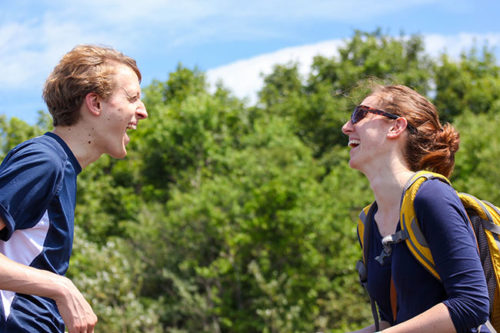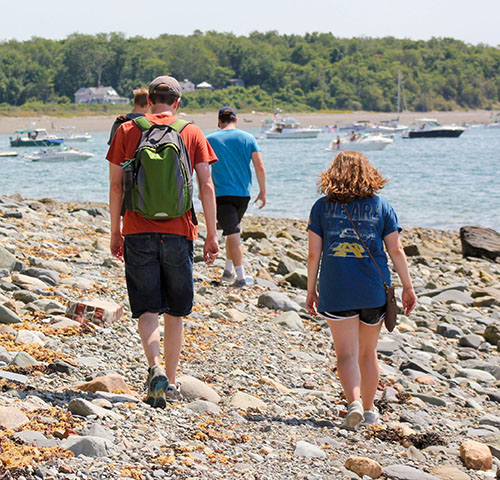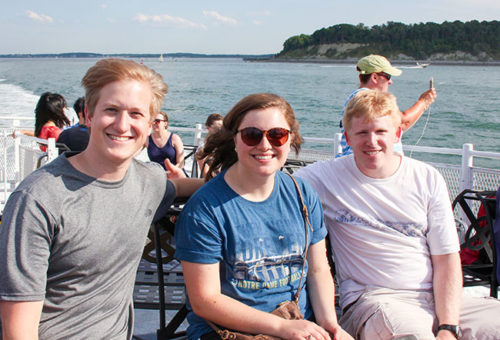Learning How to Connect with Millennials
Many alumni of A/U Ranches and DiscoveryBound (DB – formerly A/U chapter) programs have told us they remember fondly their days as campers and DB youth or teen participants, but then lost their connection to Adventure Unlimited in college and early adulthood.

Others in the Christian Science (CS) community – including Adventure Unlimited alumni and donors, churches, schools and related organizations – have told us that CS outreach to adults in their 20s and 30s is both necessary and urgent to help them stay connected to the CS community. “We recognize that often this is the time in a person’s life when he or she commits to, or chooses not to commit to, practicing Christian Science and participating in church,” says Gina Lindquist-Bailey, Adventure Unlimited’s executive director.
So what do millennials want in a CS community, and what role should Adventure Unlimited play in fostering connections? These are the questions Kynan Witters Hicks has been working to answer over the past year. As the organization’s young adult research consultant, Kynan communicated with more than 350 individuals ages 18-35 through interviews, focus groups and online surveys.
Kynan’s yearlong project has been addressing a goal in Adventure Unlimited’s strategic plans – both 2015 and now 2022 – to explore how it can serve young adults who have a connection to Christian Science.
“We’ve provided some activities for this age group, but we want to better understand what resonates with them,” says Kynan, a millennial himself. “It’s clear that a different approach is needed to appeal to this group from what our programs offer kids/teens and 40s+ adults.”
Kynan connected with a diverse group of people, including young adults who do and don’t consider themselves Christian Scientists and attend and don’t attend church. In his conversations, he’s been exploring these kinds of topics:
- Programs, activities, and/or resources 1) young adults find value in, 2) that contribute to spiritual growth and 3) that encourage them to stay connected with the Christian Science community
- How young adults want to communicate and interact with each other
- The role an organization plays in serving young adults
- Reasons young adults disengage with or are deterred from participating in a Christian Science community
Here’s some of what we learned:
Programs and resources
Young adult Christian Scientists often expressed great enthusiasm to stay connected and engage with each other on a more regular basis. Research participants shared that they value relationships they’ve developed through experiences at camp, DiscoveryBound, Principia, and other CS programs, as well as opportunities to engage with these peers as young adults. Many of them see other young adult Christian Scientists as spiritual resources for asking questions, working through challenges, and making a larger impact on the community.
“No matter how invested you are [in Christian Science], it’s kind of nice to be surrounded by people who have same base, and that same foundation. And to feel at home with those people.”
“It’s hard to be a Christian Scientist and it’s always been hard. But for me it’s been exhausting to be so exposed to the outside world and not have Principia or camp to rely on… If I had a community of young people to talk to, it would be very helpful for me. It’s hard for me not to have talked to someone who has been in the real world and dealt with [life issues] and how they intersect with faith. Those people are hard for me to find outside of Principia and camp. How else am I supposed to meet them outside of those organizations?”
“It’s important to feel that there are others out there that are working through the same challenges. It would be great to have that support community.”
How they want to interact
Overall, most research participants shared that they prefer to engage with other young adult Christian Scientists in local social activities. Social activities offer fellowship with individuals who share commonality in background, values and outlook on life. Additionally, most survey respondents said shared social experiences with spiritually like-minded individuals had considerably contributed to their spiritual growth in the past – likely attributed to the opportunities these activities provide for people to build relationships and have conversations about spirituality.
A significant number of focus group participants also expressed a desire for activities that have greater spiritual substance, such as topical spiritual discussions, Bible study groups, group lesson reading, and so on, as well as community service.
Overall, 92% of survey respondents said that they would like to attend group activities with young adult Christian Scientists.

The role of an organization
Research participants made clear that, ultimately, local activity must be community-led. Community, peer leadership and consistent engagement are important ingredients for building a community that feels authentic and meaningful. But Adventure Unlimited can play an important role in helping stimulate and support more of this local engagement by connecting with local groups of young adults and sharing ideas and resources.
“Ultimately it comes down to having the people willing to do it themselves. There may be some structural things you can put in place like offering ideas, a stipend, etc. but at end of day it takes a person willing to organize.”
“If anything, you brought us together and helped us recognize that we really would like to do something. So whether [or not] we get official funding, I think we have all the tools that we need; we are smart enough to organize something.”
Adventure Unlimited can also play a more direct role in planning national activities for young adults. In the online survey, respondents indicated that, second to local social activities, they would be most interested to participate in weekend activities with young adult Christian Scientists such as an adventure trip, vacation, camp or spiritual summits.

Reasons for disengaging
Young adults want engagement that feels personal, meaningful and natural. Research participants acknowledged that it’s challenging to get to a point where people experience a feeling of authenticity and intimacy with others in a group setting because it requires time, effort and regular engagement.
Some young adults reported choosing not to participate in a group activity because of 1) not knowing other attendees very well, 2) feeling the interaction was contrived, 3) not identifying with the activity’s purpose or 4) not wanting to be judged. Adventure Unlimited and related communities have an exciting opportunity to experiment with ways to overcome these barriers.
“I think the idea for people [in their] 20s and 30s [is] it’s all about being genuine and sincere.”
Conducting this research showed that engagement from Adventure Unlimited encourages and empowers peers to put together activities; in fact, focus groups ignited interest among many young adults to interact with one another.
Going forward, organizations that actively engage with young adults and offer ideas, resources and connections will likely spur more activity. There are already examples of groups in Boston, Denver-Boulder, Northern California and Austin that are actively putting together activities with steady interest.
This project was funded through a generous donation to Adventure Unlimited’s Bridges to the Future Campaign. If you’d like to support future programming for this 20s/30s community, click here.
Share:
Categories:
Related Articles
From the NAB: There’s So Much Alumni Can Do Right Now
Did you know that Adventure Unlimited brings experiences to 6,000+ community members, Christian Scientists and their friends each year? There are lots of fun and easy ways in the coming
What I Learned About Estate Planning from Being an Executor
Over the past year I've been the executor for two estates. I’m grateful for the many thoughtful steps that had been taken during the estate planning stages. I also discovered there
Why Your Estate Plans Matter
Annual gifts to Adventure Unlimited’s operations provide the transformative programming our participants receive each year. Similarly, planned gifts can ensure that those same programs continue in the future.